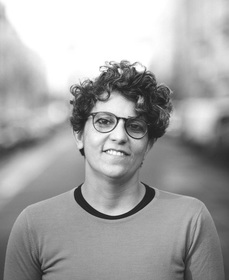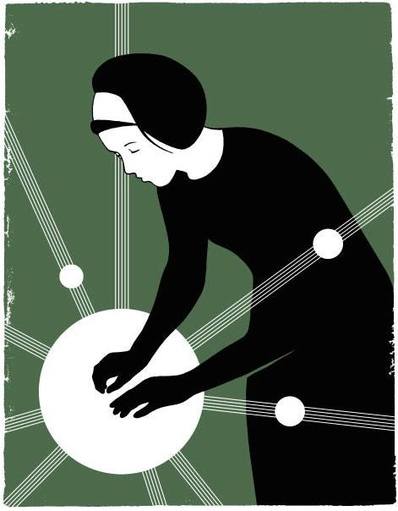course description
Sound is ubiquitous. To evade the visual, we simply close our eyes, but to escape the sonic space is nearly impossible. Cairo is a thought-provoking sonic cacophony of an average of 87 decibels; a threatening threshold to the ear. How can we think the auditory of this city and how do we produce it, negotiate it and navigate it? The seminar is an invitation to think the world through the ear. What can we learn from sound? Using an eclectic combination of lectures, experiential learning and different modes of student participation, the course will attempt to attune the aesthetic, political and social through the modulations of the auditory.
We will explore the core ideas of sound theory and its relation to the history of recording technologies with a specific interest in the avant-garde and the experimental, but only in an attempt to help us think what a tok tok driver is doing by blasting his music and how it relates to Import/Export policies or ways of policing the streets, or the reason fireworks are so popular after the revolution that they are sold in abundance on the pavements of Attaba.
In other words, we will open our ears to our surroundings. We will draft sonic diaries and attempt thinking through what we hear as well as experience the non-thought of a-signifying sounds. We will record, listen and play. We will read Jaques Attali, John Cage, Michelle Serres, Mladen Dolar, Yasser Abdel Latif, Iman Mersal, Haytham El Werdany, Pierre Schaeffer, and listen to Sun Ra, Ahmed Berrein, Mahragant Music, Yassin El Tohamy, Miles Davis, The BBC Radiophonic Workshop, Elaine Radigue, and Musique Concrète Pioneers among others. We will listen to film soundtracks, mainstream films, experimental films, films with voiceovers and more.
Other than curiosity and a sense of exploration, rigorous student participation is mandatory in accomplishing the ambitions of our learning goals in the seminar, it can only work if we are all reporting to the class from our ears.
Sound is ubiquitous. To evade the visual, we simply close our eyes, but to escape the sonic space is nearly impossible. Cairo is a thought-provoking sonic cacophony of an average of 87 decibels; a threatening threshold to the ear. How can we think the auditory of this city and how do we produce it, negotiate it and navigate it? The seminar is an invitation to think the world through the ear. What can we learn from sound? Using an eclectic combination of lectures, experiential learning and different modes of student participation, the course will attempt to attune the aesthetic, political and social through the modulations of the auditory.
We will explore the core ideas of sound theory and its relation to the history of recording technologies with a specific interest in the avant-garde and the experimental, but only in an attempt to help us think what a tok tok driver is doing by blasting his music and how it relates to Import/Export policies or ways of policing the streets, or the reason fireworks are so popular after the revolution that they are sold in abundance on the pavements of Attaba.
In other words, we will open our ears to our surroundings. We will draft sonic diaries and attempt thinking through what we hear as well as experience the non-thought of a-signifying sounds. We will record, listen and play. We will read Jaques Attali, John Cage, Michelle Serres, Mladen Dolar, Yasser Abdel Latif, Iman Mersal, Haytham El Werdany, Pierre Schaeffer, and listen to Sun Ra, Ahmed Berrein, Mahragant Music, Yassin El Tohamy, Miles Davis, The BBC Radiophonic Workshop, Elaine Radigue, and Musique Concrète Pioneers among others. We will listen to film soundtracks, mainstream films, experimental films, films with voiceovers and more.
Other than curiosity and a sense of exploration, rigorous student participation is mandatory in accomplishing the ambitions of our learning goals in the seminar, it can only work if we are all reporting to the class from our ears.
رؤية عامة
الصوت في كل مكان. نهرب من النظر ببساطة بغلق اعيننا و لكن الهروب من المساحة الصوتية شيء شبه مستحيل. القاهرة مساحة صوتية متنافرة النغمات مثيرة للتفكير,بمتوسط ٨٧ ديسيبيل و هو مقدار خطير على الأذن. كيف يمكننا التفكير في سمعيات هذه المدينة و كيف نتشارك في انتاجها، التفاوض معها، والإبحار خلالها؟ هذه الحلقة الدراسية دعوة للتفكير في العالم من خلال الأذن. ماذا يمكننا ان نتعلم من الصوت؟ بإستخدام تشكيلة انتقائية من المحاضرات، التتدريبات العملية، و اساليب عدة من المشاركة الطلابية، تهدف الدورة الي محاولة لمناغمة الجوانب الجمالية، و السياسية، و الإجتماعية من خلال التعديلات الصوتية
سوف نستكشف الافكار الجوهرية لنظرية الصوت و علاقتها بتاريخ تكنولوجيا التسجيل مع اهتمام خاص بالموجات الطليعية و التجريبية، و هذا الاستكشاف مجرد محاولة لفهم غرض سواق التوك توك في تشغيل موسيقي بصوت عالي او انتشار الالعاب النارية بعد الثورة لدرجة ان يتم بيعها على ارصفة العتبة بكثافة
بتعبير آخر، سوف نفتح آذاننا لمحيطنا لنرسم مذكرات صوتية و نحاول ان نفكر من خلال ما نسمع و في الحين نفسه نختبر السمة الغير دلالية للأصوات، نسجل و نسمع و نلعب. سوف نقرأ جاك اتالي و جون كيج و ميشيل سير و ملادن دولار و ياسر عبد اللطيف و ايمان مرسال و هيثم الورداني و بيير شيفر و نسمع صن راع و احمد بيرين و موسيقى مهرجانات و ياسين التوهامي و مايلز ديفيس و ورشة البي بي سي للراديوفونيات و ايليان راديج و مؤسسين الموسيقي الكونكرت و غيرهم. سوف نسمع تسجيلات صوتية لأفلام منها التابع للتيار و منها التجريبي و منها ذات التعليق الصوتي و المزيد
بجانب الفضول و الرغبة في التجربة، المشاركة الجادة ضرورية لتحقيق اهدافنا في هذه الحلقة الدراسية، تصبح الحلقة اكثر ثراءً كلما أشركنا الاخرين فيما نسمع
الصوت في كل مكان. نهرب من النظر ببساطة بغلق اعيننا و لكن الهروب من المساحة الصوتية شيء شبه مستحيل. القاهرة مساحة صوتية متنافرة النغمات مثيرة للتفكير,بمتوسط ٨٧ ديسيبيل و هو مقدار خطير على الأذن. كيف يمكننا التفكير في سمعيات هذه المدينة و كيف نتشارك في انتاجها، التفاوض معها، والإبحار خلالها؟ هذه الحلقة الدراسية دعوة للتفكير في العالم من خلال الأذن. ماذا يمكننا ان نتعلم من الصوت؟ بإستخدام تشكيلة انتقائية من المحاضرات، التتدريبات العملية، و اساليب عدة من المشاركة الطلابية، تهدف الدورة الي محاولة لمناغمة الجوانب الجمالية، و السياسية، و الإجتماعية من خلال التعديلات الصوتية
سوف نستكشف الافكار الجوهرية لنظرية الصوت و علاقتها بتاريخ تكنولوجيا التسجيل مع اهتمام خاص بالموجات الطليعية و التجريبية، و هذا الاستكشاف مجرد محاولة لفهم غرض سواق التوك توك في تشغيل موسيقي بصوت عالي او انتشار الالعاب النارية بعد الثورة لدرجة ان يتم بيعها على ارصفة العتبة بكثافة
بتعبير آخر، سوف نفتح آذاننا لمحيطنا لنرسم مذكرات صوتية و نحاول ان نفكر من خلال ما نسمع و في الحين نفسه نختبر السمة الغير دلالية للأصوات، نسجل و نسمع و نلعب. سوف نقرأ جاك اتالي و جون كيج و ميشيل سير و ملادن دولار و ياسر عبد اللطيف و ايمان مرسال و هيثم الورداني و بيير شيفر و نسمع صن راع و احمد بيرين و موسيقى مهرجانات و ياسين التوهامي و مايلز ديفيس و ورشة البي بي سي للراديوفونيات و ايليان راديج و مؤسسين الموسيقي الكونكرت و غيرهم. سوف نسمع تسجيلات صوتية لأفلام منها التابع للتيار و منها التجريبي و منها ذات التعليق الصوتي و المزيد
بجانب الفضول و الرغبة في التجربة، المشاركة الجادة ضرورية لتحقيق اهدافنا في هذه الحلقة الدراسية، تصبح الحلقة اكثر ثراءً كلما أشركنا الاخرين فيما نسمع

Louly SEIF is a filmmaker & a video editor born in 1976 in Alexandria & based in Cairo, Egypt. She studied Anthropology & Film at the American University in Cairo & the University of Massachusetts in Amherst. In 2011, she completed her MA degree in Aural and Visual Cultures at Goldsmiths College in London. After working in the human rights and development fields and with UNHCR in Tajikistan for few years, she began working in 2003 as an editor for commercial and independent feature films, documentaries and video art in both Dubai and Cairo. In 2006, she established a Cairo based post- production house, through which she edited a dozen of documentary films for Al Jazeera documentary channel with a strong emphasis on social, artistic and political issues in the Arab world as well as numerous independent films and video art projects. She directed two documentaries: Resurrection (Tajikistan, 2003) and 2 Femmes, 4 Chiens et 6 Jours (Belgium, 2007), as well as a short 16mm film Deuteronomy (Egypt, 2012). She is currently working on a long feature essay film funded by the Arab Fund for Arts and Culture (AFAC) in conjunction with editing fiction, documentary and art projects as well as providing training sessions on technical and theoretical aspects of non-linear montage and analogue filmmaking. In the last couple of months, she completed Up.Grade, Europe’s first 9 months postgraduate studies program for color grading at the German Film & Television Academy in Berlin (DFFB).
لولي سيف صانعة افلام و منتيرة، ولدت في عام ١٩٧٦ في الأسكندرية و تقيم بالقاهرة، درست الأنتروبولوجية و الفيلم في الجامعة الأمريكية بالقاهرة و جامعة ماسيتشوسيتس في آمهرست. في عام ٢٠١١، اتمت دراسة الماجيستير في الثقافة السمعية و البصرية في جامعة جولد سميث في لندن. بعد العمل في مجال حقوق الإنسان و التنمية و بالمفوضية السامية لشؤون اللاجئين في تاجيكستان، بدأت العمل كمنتيرة لأفلام روائية و تسجيلية و افلام فنية في دبي و القاهرة، و اسست شركة خدمات ما بعد الإنتاج في القاهرة في ٢٠٠٦ ، والتي ولفت من خلالها العديد من الأفلام التسجيلية لقناة الجزيرة الوثائقية ركزت علي جوانب إجتماعية وفنية وسياسية في العالم العربي و غيرها من مشاريع فن الفيديو و الأفلام المستقلة. قامت بإخراج فيلمين تسجيلين: بعث (تاجيكستان، ٢٠٠٣) و امرأتين، اربع كلاب ،و اربع ايام (بلجيكا، ٢٠٠٧)، و بالإضافة إلى فيلم قصير بتقنية ال١٦ ميلي سفر التثنية (مصر، ٢٠١٢). حالياً تعمل على فيلم روائي طويل ممول من الصندوق العربي للفنون و الثقافة اقتراناً بتوليف مشاريع روائية و تسجيلية و بالإضافة إلى تقديم الدورات التقنية و النظرية للمونتاج الطولي و تقنية صناعة الأفلام الأنالوج. في العام الماضي اتمت برنامج اب جريد في الأكاديمية الألمانية للفيلم و التليفزيون ببرلين و هوالبرنامج الاول من نوعه في اوروبا للدراسات العليا في تلوين الافلام


